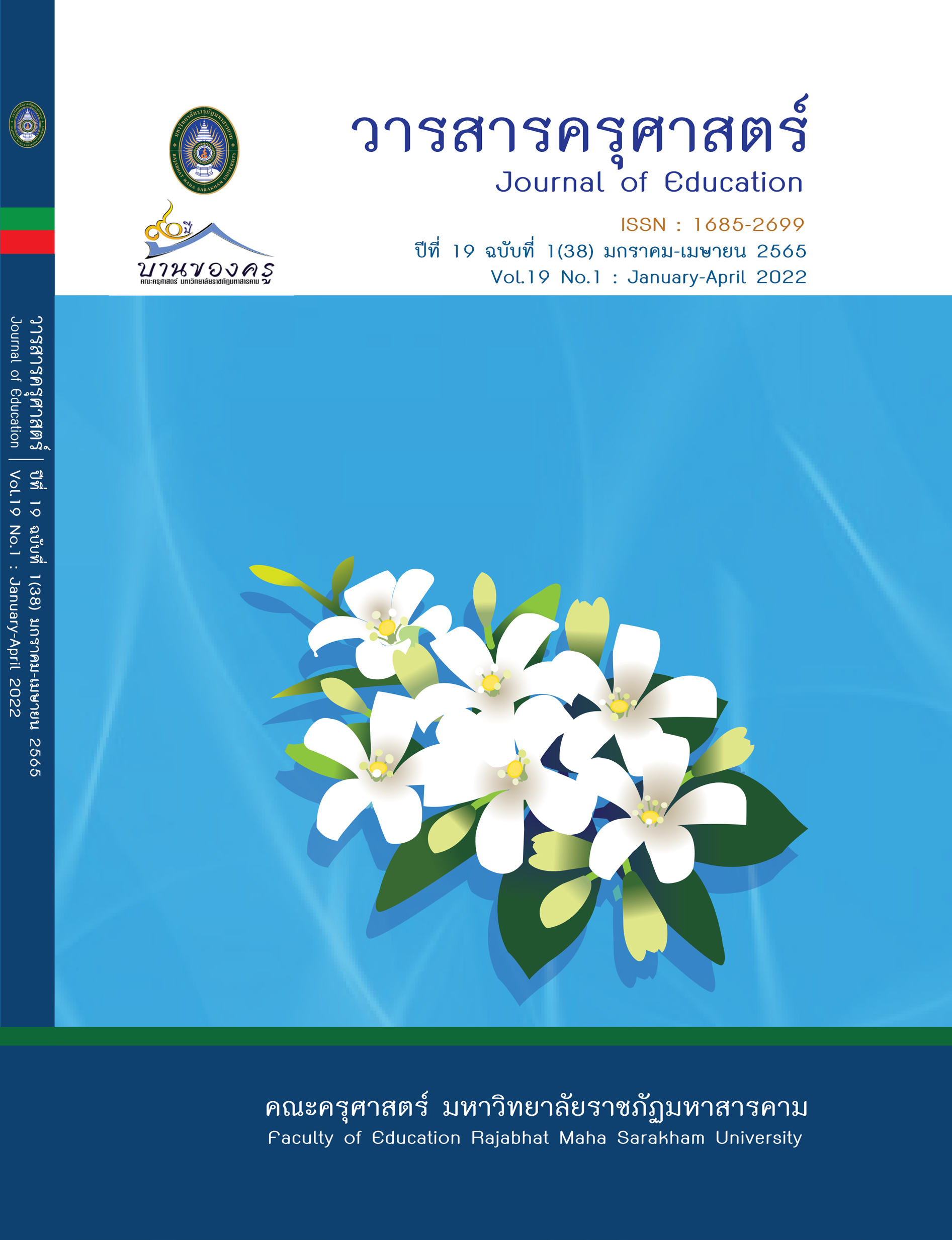Study of the correlation of Mathematics Self – Efficacy Metacognition and Mathematical Problem-Solving of Lower Secondary School Students การศึกษาความสัมพันธ์ของการรับรู้ความสามารถของตนเองทางคณิตศาสตร์ ความตระหนักในการคิดกับการแก้ปัญหาทางคณิตศาสตร์ ของนักเรียนระดับมัธยมศึกษาตอนต้น
Main Article Content
Abstract
The research aimed to (1) study the correlation of mathematics self-efficacy with mathematical problem solving of lower secondary students (2) study the correlation of metacognition and mathematical problem solving of lower secondary students and (3) study mathematical problem solving of lower secondary students with different levels of mathematical self-efficacy. The sample was 224 lower secondary students from cluster random sampling technique of Yasothon Primary Educational Service Area Office 2. Research instruments were (1) a mathematics self-efficacy test (2) a metacognition test (3) a mathematical problems-solving test and (4) the interview form of mathematical problems-solving. Statistical data analysis were percentage, mean, standard deviation and multiple correlation.
The results revealed that (1) students’ mathematical self-efficacy and metacognition was significantly correlated with problems solving mathematical at the .01 level (2) the high, moderate and low level mathematics self-efficacy had a very good, well, and fair mathematical problem-solving at respectively.
Article Details

This work is licensed under a Creative Commons Attribution-NonCommercial-NoDerivatives 4.0 International License.
ข้อกำหนดเบื้องต้นที่ผู้นิพนธ์(ผู้ส่งบทความ) ควรทราบ
1. ผู้นิพนธ์ที่ประสงค์จะลงตีพิมพ์บทความกับวารสาร ตั้งแต่เดือนมกราคม 2563 เป็นต้นไป ให้ใช้รูปแบบใหม่ (Template 2563) โดยสามารถดูตัวอย่างได้ที่เมนู GUIDELINES
2. จะตีพิมพ์และเผยแพร่ได้ ต้องผ่านการประเมินจากผู้ทรงคุณวุฒิ (Peer Review)
3. การประเมินบทความโดยผู้ทรงคุณวุฒิ (Peer Review) เป็นแบบ Double Blind
4. การอ้างอิงบทความใช้หลักเกณฑ์ APA (American Psychological Association) คลิก
5. บทความถูกปฏิเสธการตีพิมพ์ ไม่ผ่านการประเมิน ผู้นิพนธ์ขอยกเลิกเองหรือชำระเงินก่อนได้รับการอนุมัติ ทางวารสารไม่มีนโยบายการคืนเงิน
References
จุฑารัตน์ ญาณสถิตย์. (2555). การตรวจสอบความสามารถในการแก้ปัญหาคณิตศาสตร์ และความตระหนักใน
การคิดด้วยกระบวนการคิดเชิงเมตาคอกนิชันของนักเรียนชั้นมัธยมศึกษาปีที่ 3 โรงเรียนพระปริยัติธรรม
แผนกสามัญ จังหวัดกาฬสินธุ์ [วิทยานิพนธ์ปริญญามหาบัณฑิต]. มหาวิทยาลัยราชภัฏมหาสารคาม.
เฉลิมสิน สิงห์สนอง. (2559). การศึกษาปัจจัยด้านจิตพิสัยที่มีอิทธิพลต่อความสามารถในการแก้โจทย์ปัญหา
คณิตศาสตร์ในรายวิชาคณิตศาสตร์และสถิติในชีวิตประจำวัน สำหรับนักศึกษาชั้นปีที่ 1
[วิทยานิพนธ์ปริญญามหาบัณฑิต]. มหาวิทยาลัยธุรกิจบัณฑิตย์.
ปทิตตา เวียรชัย. (2552). บทบาทของความตระหนักในการคิดที่มีต่อกระบวนการแก้ปัญหาคณิตศาสตร์
[วิทยานิพนธ์ปริญญามหาบัณฑิต]. มหาวิทยาลัยขอนแก่น.
ทนงเกียรติ พลไชยา. (2556). การศึกษาความสัมพันธ์ระหว่างความเชื่อ เมตาคอกนิชัน ความเข้าใจมโนทัศน์
และความสามารถในการแก้ปัญหาทางคณิตศาสตร์ เรื่องฟังก์ชันของนักเรียนโรงเรียนจุฬาภรณราช
วิทยาลัย [วิทยานิพนธ์ปริญญาดุษฎีบัณฑิต]. มหาวิทยาลัยราชภัฏมหาสารคาม.
ทิศนา แขมมณี. (2544). วิทยาการด้านการคิด. สถาบันพัฒนาคุณภาพวิชาการ.
ธิภาวดี มูลสุวรรณ. (2555). การศึกษากระบวนการคิดเชิงอภิปัญญาในการแก้ปัญหาทางคณิตศาสตร์ของครูที่
สอนในระดับมัธยมศึกษาตอนต้น [วิทยานิพนธ์ปริญญามหาบัณฑิต]. มหาวิทยาลัยขอนแก่น.
สถาบันส่งเสริมการสอนวิทยาศาสตร์และเทคโนโลยี. (2555). การวัดผลประเมินผลคณิตศาสตร์. ซีเอ็ดยูเคชั่น.
สุพัตรา แสงสุวรรณ. (2549). การพัฒนาแบบวัดความสามารถการคิด สำหรับนักเรียนชั้นมัธยมศึกษาปีที่ 3
[วิทยานิพนธ์ปริญญามหาบัณฑิต]. จุฬาลงกรณ์มหาวิทยาลัย.
Bandura, A. (1977). Self-efficacy: Toward a unifying theory of behavioral change. Journal of Stanford
University USA.
Beyer, B. K. (1987). Practical strategies for the teaching of thinking. Boston, MA: Allyn and Bacon.
Bloom, B. S. (1976). Human characteristics and school learning. McGraw-Hill.
Flavell, J. H. (1979). Metacognition and cognitive monitoring: A new area of cognitive–developmental inquiry.
American Psychologist, 34(10), 906–911. https://doi.org/10.1037/0003066X.34.10.906
Hoffman, B. (2010). ‘I think I can, but I’m afraid to try’: The role of self-efficacy beliefs and mathematics anxiety
in mathematics problem-solving efficiency. Learning and individual Differences, 20(3), 276-283.
http://doi.org 10.1016/j.lindif.2010.02.001
Inprasitha, M. (2002). Problem Solving: Reform Mathematics Instruction. The Journal of The National Research
Council of Thailand. 29(2), 221-259.
Jaafar, W. M. W., and Ayub, A. F. M. (2010). Mathematics self-efficacy and meta-cognition among University student.
Procardia – Social and Behavioral Sciences, 8(3), 519-524.
Lester, F. K., Garofalo, J. and Kroll, D. L. (1989). The Role of Metacognition in Mathematical Problem Solving:
A Study of Two Grade Seven Classes) [Unpublished doctoral dissertation]. Indiana University.
Neil, H. F., Jr., and Abedi, J. (1996). Reliability and validity of a state metacognitive inventory: Potential
for alternative assessment. The Journal of Educational Research, 89(4), 234-245.
https://doi.org/10.1080/00220671.1996.9941208
Pajares, F., and Miller, M. D. (1994). Role of Self-efficacy and self-Concept beliefs in mathematical problem
solving: a path analysis. Journal of Educational Psychology.
Poliny, U. (2555). อิทธิพลของการกำกับตนเองและการรับรู้ความสามารถของตนเองทางคณิตศาสตร์ที่มีต่อ
ความวิตกกังวลในการเรียนคณิตศาสตร์ของนักเรียนชั้นมัธยมศึกษาตอนปลายในราชอาณาจักร
กัมพูชา [วิทยานิพนธ์ปริญญามหาบัณฑิต ไม่ได้ตีพิมพ์]. มหาวิทยาลัยบูรพา.
Polya, G. (1957) How to Solve It. A New Aspect of Mathematical Method. 2nd Edition, Princeton
University Press, Princeton.
Tanner, H., and Jones, S. (2003). Self-efficacy in mathematics and students’ use of self-regulated
Learning strategies during assessment events. Paper presented at the 25th international Group for
the Psychology of Mathematics Education Conference Held Jointly with the 25th PME-NA Conference.
Schoenfeld, A. H. (1985). Mathematical Problem Solving. Academic Press.
Schunk, D. H. (1985). Self-efficacy and classroom learning. Prentice-Hall.
Zakaria and Nordin. (2008). The Effects of Mathematics Anxiety on Matriculation Students as Related to
Motivation and Achievement. Eurasia Journal of Mathematics Science & Technology Education.
(1), 27-30.


